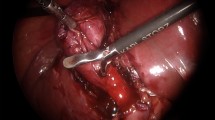Abstract
Introduction
The study aims to evaluate the use of “critical view of safety” (CVS) for the prevention of bile duct injuries during laparoscopic cholecystectomy for acute biliary pathology as an alternative to routine intraoperative cholangiography (IOC).
Methods
A policy of routine CVS to identify biliary anatomy and selective IOC for patients suspected to have common bile duct (CBD) stone was adopted. Receiver operator curves (ROCs) were used to identify cutoff values predicting CBD stones.
Results
Four hundred forty-seven consecutive, same admission laparoscopic cholecystectomies performed between August 2004 and July 2007 were reviewed. CVS was achieved in 388 (87%) patients. Where CVS was not possible, the operation was completed open. CBD stones were identified in 22/57 patients who underwent selective IOC. Preoperative liver function and CBD diameter were significantly higher in those with CBD stones (P < .001). ROC curve analysis identified preoperative cutoff values of bilirubin (35 μmol/L), alkaline phosphatase (250 IU/L), alanine aminotransferase (240 IU/L), and a CBD diameter of 10 mm, as predictive of CBD stones. No bile duct injuries occurred in this series.
Conclusion
In acute biliary pathology, the use of CVS helps clarify the anatomy of Calot's triangle and is a suitable alternative to routine IOC. Selective cholangiography should be employed when preoperative liver function and CBD diameter are above defined thresholds.


Similar content being viewed by others
References
Boerma D, Rauws EAJ, Yolande C, Huibregtse K, Gouma DJ. Impaired quality of life 5 years after bile duct injury during laparoscopic cholecystectomy: a prospective analysis. Annals of Surgery 2001 ;234, No. 6, 750–757
Connor S, Garden OJ. Bile duct injury in the era of laparoscopic cholecystectomy. Br J Surg 2006; 93: 158–168.
Strasberg SM, Hertl M, Soper NJ. An analysis of the problem of biliary injury during laparoscopic cholecystectomy. J Am Coll Surg 1995;180:101–125
Ludwig K, Bernhardt J,Steffen H, Lorenz D. Contribution of intraoperative cholangiography to incidence and outcome of common bile duct injuries during laparoscopic cholecystectomy, Surg Endosc 2002;16:1098–1104,
Massarweh NN, Flum DR. Role of intraoperative cholangiography in avoiding bile duct injury. Journal of the American College of Surgeons 2007;204: 656–664.
Rieger R, Wayand W. Yield of prospective, noninvasive evaluation of the common bile duct combined with selective ERCP/sphincterotomy in 1390 consecutive laparoscopic cholecystectomy patients. Gastrointest Endosc. 1995;42:6–12
Avgerinos C, Kelgiorgi D, Touloumis Z, Baltatzi L, Dervenis C. One thousand laparoscopic cholecystectomies in a single surgical unit using the “Critical View of Safety” technique. J Gastrointest Surg 2009; 13:498–503
Yegiyants S, Collins JC. Operative strategy can reduce the incidence of major bile duct injury in laparoscopic cholecystectomy. Am Surg. 2008;74(10):985–7.
Zweig MH, Campbell G. Reciever-operating charecterestic plots: fundamental evaluation tool in clinical medicine. Clinical Chemistry 1993;39:561–577.
Gates JA, Tompkins RK, Zinner MJ, Busuttil RW, Kallman C, Roslyn JJ. Biliary complications of laparoscopic cholecystectomy. Am Surg 1993;59:243–247
Linda SGL. Wauben AE, Richard HM, Goossens AE, Daan J. van Eijk AE, Lange JF. Evaluation of protocol uniformity concerning laparoscopic cholecystectomy in the Netherlands. World J Surg 2008;32:613–620.
Wijsmuller AR, Leegwater M, Tseng L, Smaal HJ, Kleinrensink GJ, Lange JF. Optimizing the critical view of safety in laparoscopic cholecystectomy by clipping and transecting the cystic artery before the cystic duct. Br J Surg. 2007;94(4):473–4.
Strasberg SM. Biliary injury in laparoscopic surgery: Part 2. Changing the culture of cholecystectomy. J Am Coll Surg 2005;201(4):604–11.
David GG, Al-Sarira AA, Willmott S, Deakin M, Coreless DJ, Slavin JP. Management of acute gallbladder disease in England. British Journal of Surgery 2008;95:472–476.
Sanjay P, Moore J, Saffouri E, Kulli C, Polignano FM, Tait IS. Index laparoscopic cholecystectomy (LC) for acute admissions with cholelithiasis provides excellent training opportunities in emergency general surgery. Surgeon 2010;8(3):127–131
Amott D, Webb A, Tulloh B. Prospective comparison of routine and selective operative cholangiography. ANZ J Surg 2005;75:378–382.
Sarli L, Costi R, Roncoroni L, Intraoperative cholangiography and bile duct injury, Surg Endosc 2006;20:176–177
Hauer-Jensen M, Karesen R, Nygaard K et al., Prospective randomized study of routine intraoperative cholangiography during open cholecystectomy: long-term follow-up and multivariate analysis of predictors of choledocholithiasis, Surgery 1993;113:318–323.
Daniel G. Clair, David L. Carr-Locke, James M. Becker, David C. Brooks. Routine cholangiography is not warranted during laparoscopic cholecystectomy. Arch Surg. 1993;128(5):551–555.
Stark ME, Loughry CW. Routine operative cholangiography with cholecystectomy, Surg Gynecol Obstet 1980; 151: 657–658
Menezes N, Marson LP, de Beaux AC, Muir IM, Auld CD. Prospective analysis of a scoring system to predict choledocholithiasis. Br J Surg 2000; 87: 1176–1181.
Onken JE, Brazer SR, Eisen GM, Williams DM, Bouras EP, DeLong. Predicting the presence of choledocholithiasis in patients with symptomatic cholelithiasis. Am J Gastroenterol 1996; 91: 762–767.
Jarvinen H. Abnormal liver function tests in acute cholecystitis; the predicting of common duct stones. Ann Clin Res 1978; 10: 323–327.
Carlsen JE, Lauritzen T, Juul K, Hermann C, Hansen PH. Common duct stones in patients with acute cholecystitis. Acta Chir Scand 1977; 143: 47–48.
Author information
Authors and Affiliations
Corresponding author
Rights and permissions
About this article
Cite this article
Sanjay, P., Fulke, J.L. & Exon, D.J. ‘Critical View of Safety’ as an Alternative to Routine Intraoperative Cholangiography During Laparoscopic Cholecystectomy for Acute Biliary Pathology. J Gastrointest Surg 14, 1280–1284 (2010). https://doi.org/10.1007/s11605-010-1251-6
Received:
Accepted:
Published:
Issue Date:
DOI: https://doi.org/10.1007/s11605-010-1251-6




